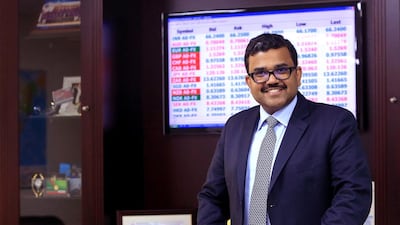UAE Exchange said there has been a surge in remittances to Asian countries such as India, Pakistan and the Philippines as the strengthening US dollar-pegged dirham prompts expatriates to send more money back home to buy things such as property.
While in the first six months of the year UAE Exchange had a 12 per cent year-on-year gain in the volume of remittances to US$6.4 billion, in the past two months alone that rise has been closer to 18 per cent annualised amid the accelerated sell-off in emerging market currencies, according to Promoth Manghat, the exchange house’s chief executive.
Typical annual growth in remittances for UAE Exchange is between 8 to 10 per cent, he said.
“In the scenario where the Asian currencies are weakening against the dollar, you see a sudden spike in the volume of those opportunistic remitters in terms of activities,” said Mr Manghat at his office in Abu Dhabi.
“Whenever there is a strong dollar, always the proportion of remittances is high.”
Almost US$600bn is transferred by workers back home each year around the world, providing the businesses that make money out of transfers, such as Western Union, with more than $40bn in revenues, according to the World Bank.
In the UAE, about $18bn is sent back home by workers each year, according to the World Bank.
Mr Manghat estimates that UAE Exchange, which was established in 1980 and has a presence in more than 30 countries, has between 55 and 65 per cent market share of remittances in the UAE.
The lion’s share of remittances, about 40 per cent, goes to India, he said.
The Bloomberg Dollar Spot Index, which tracks the currency against 10 major peers, gained 11 per cent last year, the biggest annual rise since 2004, as the US economy outperformed its peers.
The index is up 4.6 per cent for the year to date, with the currencies of India, Pakistan and the Philippines having dropped in line with the dollar index’s gain.
The UAE dirham, which has been pegged to the US dollar at 3.6725 dirhams since 1997, has been spared the agony of the drop in emerging market currencies, as have most Arabian Gulf countries with similar arrangements.
Emerging market currencies, particularly those of countries that are major commodity producers, such as Brazil and Russia, have been particularly hurt as the price of everything from wheat, oil and copper declines amid waning demand from huge consumers such as China.
Crude oil, which pumps up growth in this part of the world and other areas including Russia and Colombia, has lost more than half of its value in the past year.
The decline in crude prices does not worry Mr Manghat that much because he says UAE authorities are still on track to build many projects, including the newest Abu Dhabi airport terminal. That will require an influx of more workers to help build them, and these labourers will invariably send money back home to their loved ones, he said.
While the majority of remitters in this country are from blue-collar workers from the Indian subcontinent who still prefer to send money physically at exchange houses rather than online, Mr Manghat said UAE Exchange was forging ahead with a plan to offer its services outside its branches through digital channels, such as the internet and mobile phones.
This year, the company proposed a plan to the central bank to do that, and it is still working closely with the regulator to get it pushed through.
“Digital transformation is going to be the theme for us,” Mr Manghat said. “So we want to look at how we can expand our services offering, how we can deepen our services offerings. How we can expand the customer base.”
mkassem@thenational.ae
Follow The National's Business section on Twitter

